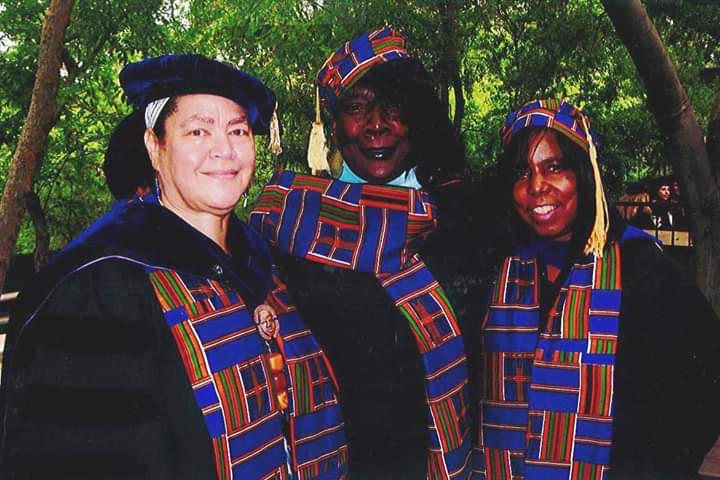Cheryl Greer-Jarman was a child of Pasadena. She grew up on Pepper Street, the same street where Jackie Robinson was raised and where Robinson and young Greer-Jarman’s mothers kept a close eye on the children in the neighborhood. “People at Pacific Oaks knew when something happened in Pasadena, you go to Cheryl, because she’s going to know the story,” says Marsha Swindler, Ph.D., a longtime colleague of Greer-Jarman’s at Pacific Oaks College and herself a Pasadena native.
Dr. Jack Paduntin, former president of Pacific Oaks College, remembers that when the college’s contingent marched in the annual Pasadena Black History Parade, everyone in the crowd seemed to know Greer-Jarman. “She was a hometown celebrity,” he says. “People would point and tell their children ‘She was my teacher.’”
As the college’s longest serving faculty member, Greer-Jarman’s roots ran deep at Pacific Oaks as well. She worked there for 45 years as an educator, administrator, and long-time president of the faculty senate. Her contributions as a teacher, mentor, and pedagogical theorist were legendary. While in her 20s, Greer-Jarman began her career as a teacher in the children’s school and shortly afterward became a master teacher. She was teaching in the kindergarten when ReGena Booze, Ph.D., a teacher in the preschool, approached her with questions about how to prepare her students for Greer-Jarman’s classroom. That began a 35-year friendship and professional working relationship,
“We led two really different lives,” Dr. Booze says. “I called her ‘the church lady,’ and she called me ‘the militant.’” The two formed a partnership that led to enduring changes at Pacific Oaks. With Greer-Jarman’s support, Dr. Booze and several other teachers in the Burgess House preschool earned their master’s degrees, and they pressed the administration to increase the number of master teachers at the children’s school. Along with Pacific Oaks colleague Olga Winbush, Ph.D., they provided the expertise and experience of African American educators to the Antibias Task Force, which included Betty Jones, Ed.D., and Louise Derman-Sparks, M.A. The resulting work, “Anti-Bias Curriculum,” changed the perceptions of how issues of race, gender, and sexuality were addressed in classrooms.

They soon received invitations to speak across the country and around the world. Dr. Booze encouraged Greer-Jarman to overcome her aversion to flying, and Greer-Jarman attended conferences as far away as Oxford, England, and Hamburg, Germany. “We watched it grow from our yards into an international movement,” Dr. Booze says. “We were getting people to think about being purposeful in what you teach and what you say and what you do with young children, just something as simple as a selection of children’s books.”
As a faculty member in the Department of Human Development, Greer-Jarman was a natural mentor and leader. “The very first person I met after getting hired at Pacific Oaks was Cheryl; she was the president of Faculty Senate,” Dr. Swindler recalls. “As a colleague, I had to earn her trust.” Before long, Greer-Jarman approached Dr. Swindler and invited her to serve as secretary for what would come to be called the Faculty Senate (and later the Faculty Council), a partnership that lasted four years. “Normally, president is a one-year job, but Cheryl was good at it and just continued,” Dr. Swindler says.
Dr. Swindler, who carpooled with Greer-Jarman for many years, remembers her as a woman devoted to her family and to her church, where she played the piano. When her parents and later her brother fell ill, Greer-Jarman managed their care while her colleagues covered her classes. The demands of this effort meant that she had to forgo pursuing the doctorate that she aspired to earn. “That really touched me, because she wanted to reach another pinnacle in her career,” Dr. Swindler says, “but she knew that her family needed her more.” Dr. Swindler did not know, however, that years earlier, while working on the Antibias Task Force, Dr. Booze had bestowed upon Greer-Jarman the honorary “Ph.L.” or “Doctor of Life,” to recognize the wisdom she had gained in all aspects of her life.
Dr. Paduntin shares that, on his way to the parking lot each evening, he would pass by Greer-Jarman’s book-lined office, and often she wanted to talk. “She was my teacher too,” he says. “She lived the Pacific Oaks mission, everything the college stood for, its core values and commitment to social justice.”

